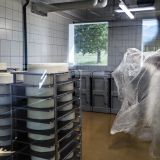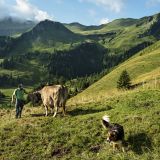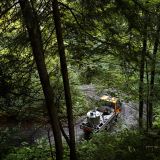Dominic Nahr
Organic cheese – made in Switzerland
Münsterhof
Organic farming is gaining increasing importance in Switzerland. It is ecologically sustainable, avoids the use of synthetic chemicals, genetic engineering, and pesticides. The principles of organic farming aim to protect the environment, promote biodiversity, and produce healthy food.
Organic farming in Switzerland has a positive impact on soil quality, water management, biodiversity, and ecosystem health. One challenge remains: yields per hectare are lower compared to conventional production.
“My family consciously chooses organic products,” says Dominic Nahr. “As a photojournalist, it was an exciting challenge for me to document the journey of Swiss organic cheese from its origin to the consumer – at a time when the understanding of gentle and respectful management and use of natural resources is gaining increasing critical importance.”
Dominic Nahr was born in 1983 in Appenzell, Switzerland, and grew up in Hong Kong. In 2008, he graduated from the School of Image Arts at Ryerson University in Toronto, Canada, with a Bachelor of Fine Arts degree, and moved to Nairobi, Kenya, in 2009. In addition to numerous awards, Nahr received the Leica Oskar Barnack Newcomer Award in 2009 and won second place in the 2023 Swiss Press Photo competition for his work in Ukraine. His clients include NZZ, TIME, GEO, Stern, The New Yorker, National Geographic, Médecins Sans Frontières (Doctors Without Borders), and Save the Children. Nahr’s photographs have been showcased at internationally significant festivals – including Arles and twice in Perpignan. Dominic Nahr works as a photographer and editor at Neue Zürcher Zeitung (NZZ).
Curated by Dominic Nahr / Printed by ![]()
Discover here contributions of ETH Zurich to the Sustainable Development Goal (SDG) 12:
Tackling economies outside the law
Joschka Johann Proksik
Unlawful economic practices, hidden value chains: they’re the kinds of murky business that Dr. Joschka J. Proksik tackles with his research.
Joschka’s interest in illicit economies was sparked during a study trip to Kosovo in 2009. It became clear that the presence of illegal economic activities, including organised crime, had far-reaching effects on peace, development, democracy, the rule of law, and local politics. This experience broadened his perspective on how illicit economies function. He came to see them as more than a set of illegal activities, but rather as complex phenomena with profound political, economic, and social implications.
In regions where illicit economies flourish, the boundaries between what is legal and illegal becomes often blurred. Addressing this phenomenon is not merely a technical challenge for law enforcement – it is deeply intertwined with political dynamics.
Curbing illicit financial flows to finance global goals
Joschka’s current research deals specifically with informal and illicit economic practices linked to the extraction of natural resources in developing countries, and how they connect with global trading hubs. Increased demand for valuable minerals like gold, is enticing many poor people to turn to informal mining to make a living. But most informal miners operate outside the law and without oversight. As a result, although informal mining has the potential to alleviate poverty and foster local development, it often leads to adverse public effects for entire communities, f.e. poor public health, and massive environmental degradation. In some of the worst cases, such operations are also linked to forced and child labour, sexual and drug abuse, as well as the funding of criminal and armed groups.
There are negative impacts at the national level too. Many producer countries lose out financially, because they are unable to collect taxes on resources that are illegally traded and smuggled across borders. This loss of revenue deprives governments of much-needed income to build infrastructure, fund education and health services, and more broadly to finance efforts towards meeting the SDGs.
Ultimately, the ability to address challenges related to informal mining and illicit trade will shape countries’ potential to lift people out of poverty, and enable sustainable livelihoods. The implications are global, too: environmental impacts such as mercury pollution and deforestation contribute to climate change and biodiversity loss, among other far-reaching consequences.
Joschka is also planning to investigate the impacts of the ‘green energy’ transition, and the related demand for critical minerals such as lithium, on the regions that produce them.
Use gold responsibly!
Based on insights from his research, Joschka urges consumers to be mindful of the origins of minerals used in electronics and jewellery. The more we all show concern and make inquiries about production conditions, the more likely it is that producers and traders will adopt more responsible sourcing practices. Nonetheless, the establishment of global sustainability standards and responsible supply chains requires international cooperation and fair economic exchange relations.
“To achieve a sustainable future, it is crucial to overcome the current geopolitical conflicts and great power rivalries. These conflicts hinder effective international cooperation and impede progress towards a more equitable global order. This requires courage and responsible political leadership in the Global North and South.”
Joschka J. Proksik, Post-Doc in Development Economics at ETH Zurich
A sensual and intriguing food experience
Tastelab
Active since 2015, the ETH spin-off Tastelab was founded by astrophysicist Sue Tobler and computer scientist Remo Gisi. They combined their three big passions: food, science and making things happen. Both culinary visionaries and experimental scientists, the Tastelab-team is recognised as the leading creator of sensual and thought-provoking experiences around food, science, and sustainability. This love affair between cooking and science is all about the future of food.
Sue inherited a passion for cooking from her mother. She did her first paid catering job at age 11, during a ski holiday. Remo shares her love for organising food-related events, as well as an enthusiasm for bringing people together to experience exceptionally tasteful, sustainable, high-quality food.
From physics to food
“Everything in life happens for a reason. And that reason is usually physics.”
Sue and Remo believe you can become a better cook and restaurant entrepreneur if you have a solid grasp of the cooking process, if you understand the whole life cycle of food from farm to table, and if you approach the culinary trade with an analytically trained mind. They break down scientific results to turn them into compelling stories on food production and processing, cooking, and catering.
For the Tastelab team every food has a story, and eating is an experience. Their events raise awareness of this while creating memories for their guests.
The taste we perceive through the mouth and nose is just a small part of what’s really happening in the brain when we eat. Our sense of taste is created mainly in our brain, and 80% of it is already in place by the time food enters the mouth. According to Sue and Remo’s analysis, this means that the biggest hurdle to making food consumption and production more sustainable is, in fact, psychological.
One of their projects focuses on reducing the footprint of food to the smallest possible over its entire life cycle. Since 2019, they have been cooking with solely plant-based ingredients, because they believe that is one of the biggest single decisions towards a more sustainable kitchen. Tastelab works with two other ETH Spin-offs: Planted, and another start-up enterprise working with a prawn substitute based on microalgae.
Food is tradition, and a part of our identity. Tastelab and their collaborators show by example how fun and diverse plant-based food can be.
The future is plant-based
To consume and produce food more responsibly, it is important to use less resources. That usually means turning to plant-based food. Keen to spread the message of what’s possible, Tastelab now approaches traditional French restaurants in Zürich, inviting them to use their vegan foie gras which is made mostly of cashews and pines. Remo’s vision for the future food system is rooted in global awareness, but local success. It is a future where we eat better, healthier, and more luxuriously, while causing less environmental and social damage in parts of the world where our food is produced.
“Consume more consciously and rethink your stereotypes in food. Be open to enjoy the diversity of plant-based food.”
Remo Gisi, Co-founder of Tastelab
Cows on a diet that helps the planet
Mutian Niu
Professor Mutian Niu’s passion for animal health was carved out of his own name: in Chinese, ’Niu’ or 牛 means „cattle“, and ’Mutian’ or 牧田 means „grazing in the field“. Born and raised in China, where he studied animal science, he continued his studies in the United States, where his main study subject was dairy cattle – as it is now. In 2021, he joined ETH Zurich as Assistant Professor of Animal Nutrition.
Cow on a diet
Globally, ruminants are the primary source of meat and dairy products. They also serve an important function by transforming nutrients: cattle, sheep and goats can digest plants that humans cannot eat into valuable food products. But the process of digesting grass and other plant materials releases methane as a byproduct – a potent greenhouse gas.
This raises the question of what a cow could eat to produce less methane. Niu’s research group tackles this question by focusing both on the types of feed and nutritional physiology of animals, and on improving the sustainability and efficiency in the livestock system. They develop nutritional strategies for cows, goats, sheep, and other animals exploited for dairy and meat production, aiming to improve how livestock utilise nutrients while mitigating environmentally harmful methane and nitrous oxide emissions.
Their work suggests that, with only a little feed additive, methane emissions can be reduced by around 30%. Much improvement can also be made by changing the composition of animal feed made with grains they already eat, such as grasses and legumes.
Animal welfare in a changing climate
Niu and his team plan to extend their work beyond reducing the environmental impact of ruminants, turning the question around to also investigate how climate change affects the animals. Cows, for example, are very susceptible to heat, which lowers their immune responses and leads to inflammation. Heat waves can also affect animal welfare through changes in behaviour, as well as the production and quality of their feed.
In searching for nutritional solutions to counteract these changes, Niu’s team is collaborating with research groups at ETH Zurich and in other countries. One of their approaches is to leverage precision farming technology and computer vision tools, for example using artificial intelligence methods to improve how animals are monitored. In a joint project with the ETH analytical chemistry group, the animal nutrition researchers are developing new ways of checking the animals’ health with non-invasive methods, through the breath.
“First, ruminants are important. Second, believe in science!”
Prof. Dr. Mutian Niu, Head of the Animal Nutrition Group at ETH Zurich
open your eyes festival buerau
Botenaustrasse 42
9443 Widnau
Switzerland
Phone: +41 44 218 11 03




